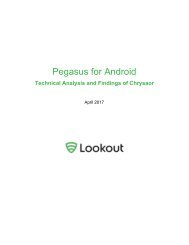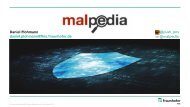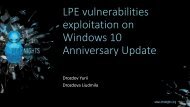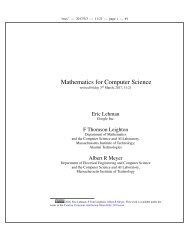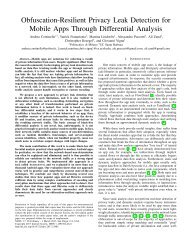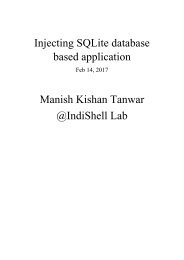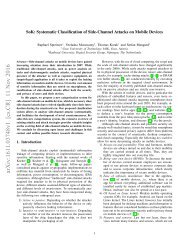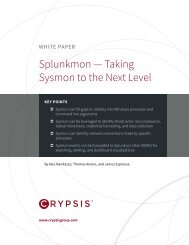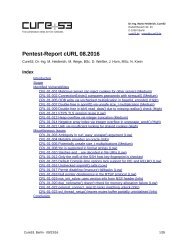You also want an ePaper? Increase the reach of your titles
YUMPU automatically turns print PDFs into web optimized ePapers that Google loves.
Within OSUnserializeBinary, a while loop iterates through each encoded object within <str<strong>on</strong>g>the</str<strong>on</strong>g><br />
supplied data blob. The loop begins by determining <str<strong>on</strong>g>the</str<strong>on</strong>g> type <str<strong>on</strong>g>of</str<strong>on</strong>g> object (e.g.,<br />
kOSSerializeDicti<strong>on</strong>ary, kOSSerializeArray, kOSSerializeNumber, and so <strong>on</strong>) and<br />
its size.<br />
len = (key & kOSSerializeDataMask);<br />
...<br />
switch (kOSSerializeTypeMask & key)<br />
{<br />
case kOSSerializeDicti<strong>on</strong>ary:<br />
o = newDict = OSDicti<strong>on</strong>ary::withCapacity(len);<br />
newCollect = (len != 0);<br />
break;<br />
case kOSSerializeArray:<br />
o = newArray = OSArray::withCapacity(len);<br />
newCollect = (len != 0);<br />
break;<br />
case kOSSerializeSet:<br />
o = newSet = OSSet::withCapacity(len);<br />
newCollect = (len != 0);<br />
...<br />
case kOSSerializeObject:<br />
if (len >= objsIdx) break;<br />
o = objsArray[len];<br />
o->retain();<br />
isRef = true;<br />
break;<br />
...<br />
}<br />
The switch statement dispatches <str<strong>on</strong>g>the</str<strong>on</strong>g> appropriate instructi<strong>on</strong>s for handling each type <str<strong>on</strong>g>of</str<strong>on</strong>g> object<br />
found within <str<strong>on</strong>g>the</str<strong>on</strong>g> data blob. These instructi<strong>on</strong>s can generate new objects and set flags related to<br />
<str<strong>on</strong>g>the</str<strong>on</strong>g> objects depending <strong>on</strong> what <str<strong>on</strong>g>the</str<strong>on</strong>g> particular object requires during <str<strong>on</strong>g>the</str<strong>on</strong>g> deserializati<strong>on</strong> process.<br />
The kOSSerializeObject object type is a special case that represents an already<br />
deserialized object and, as such, sets a flag isRef to true indicating that <str<strong>on</strong>g>the</str<strong>on</strong>g> object is a<br />
reference to an existing object already within <str<strong>on</strong>g>the</str<strong>on</strong>g> objsArray array.<br />
If <str<strong>on</strong>g>the</str<strong>on</strong>g> isRef value is not set to true, <str<strong>on</strong>g>the</str<strong>on</strong>g> current object that just underwent deserializati<strong>on</strong> is<br />
added to <str<strong>on</strong>g>the</str<strong>on</strong>g> objsArray by means <str<strong>on</strong>g>of</str<strong>on</strong>g> setAtIndex:<br />
if (!isRef)<br />
{<br />
setAtIndex(objs, objsIdx, o);<br />
if (!ok) break;<br />
objsIdx++;<br />
}<br />
setAtIndex is a macro that, am<strong>on</strong>g o<str<strong>on</strong>g>the</str<strong>on</strong>g>r things, adds an object (o) to <str<strong>on</strong>g>the</str<strong>on</strong>g> objsArray. While<br />
more robust array objects exist within <str<strong>on</strong>g>the</str<strong>on</strong>g> <strong>iOS</strong> envir<strong>on</strong>ment, such as OSArray (an array<br />
c<strong>on</strong>tainer that will handle reference counting automatically), OSUnserializeBinary takes a<br />
more manual route for array-object management <str<strong>on</strong>g>of</str<strong>on</strong>g> <str<strong>on</strong>g>the</str<strong>on</strong>g> objects it has deserialized. Once<br />
Page 26




